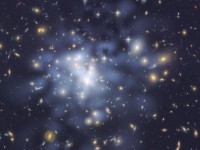Dark riddle of the Universe is focus of global contest

People around the world are invited to help solve one of the Universe's enduring mysteries.
Astronomers from the School of Physics & Astronomy have launched a public competition to help them learn more about dark matter, which accounts for 95 per cent of the mass of the Universe but cannot be seen and is little understood.
The researchers have joined forces with crowdsourcing data science website Kaggle and Winton Capital Management to find people who are interested in taking up the challenge. It is hoped the contest will inspire thousands of people to tackle the problem, using a variety of techniques.
The competition is expected to attract people who solve numerical problems for a living, such as scientists, statisticians and data engineers, who may find a solution by adapting an existing problem-solving tool from a field of expertise outside astronomy.
"By encouraging thousands of people to focus on a problem, we have a good chance of making progress quickly. This competition could make a real difference in solving an enigma that has puzzled astronomers for decades." David Harvey, School of Physics & Astronomy, University of Edinburgh
Dr Tom Kitching, of the University's School of Physics & Astronomy, said: “This kick-starts a new way for cutting edge science to interact with the private sector. Scientists have problems that need solving, data scientists world-wide are searching for interesting problems and exciting career opportunities. By working together it’s a win-win situation: the problem of solving dark matter gets a boost, the competition winners receive a prize.”
Prizes of US$12,000, US$5,000 and US$3,000 are being provided by Winton, which uses similar data science techniques to build automated trading systems for financial markets.
Mapping dark matter
Dark matter is known to cause galaxies to form clusters in space. Scientists want to develop ways to analyse images of these galaxy clusters, taken by the Hubble telescope. This will enable them to better understand how the clusters have formed, and create a map of dark matter, giving insight into its make-up.
The Observing Dark Worlds competition can be found at http://www.kaggle.com/c/DarkWorlds
Entrants have until 16 December to submit their ideas.

